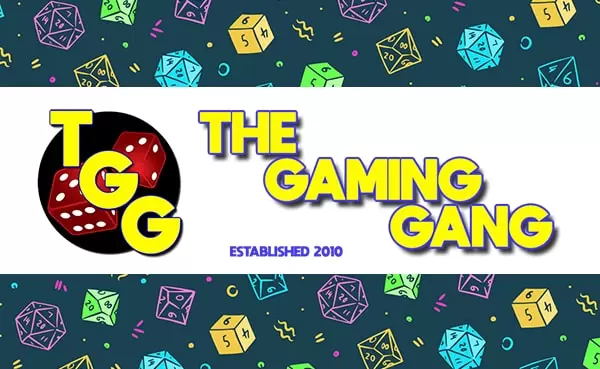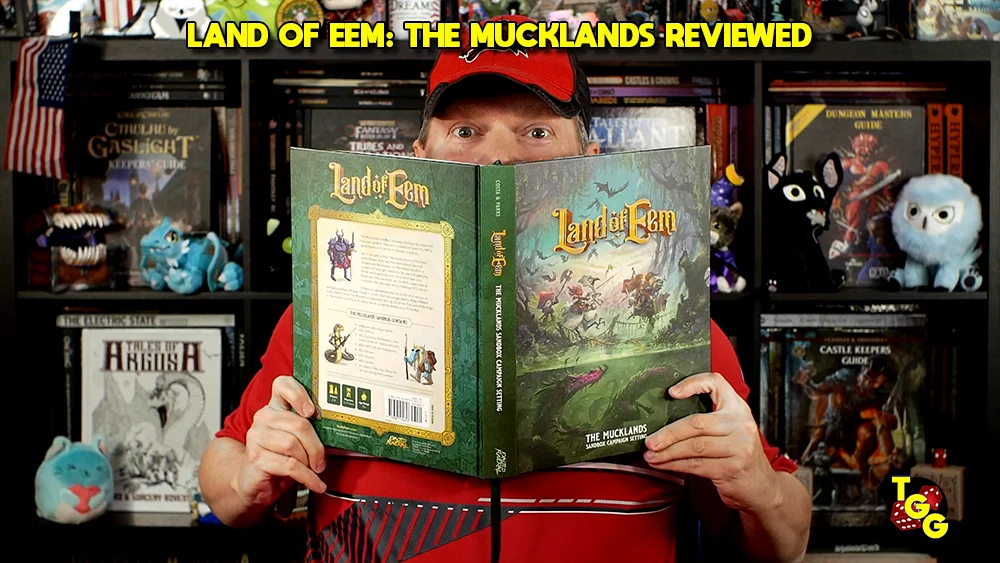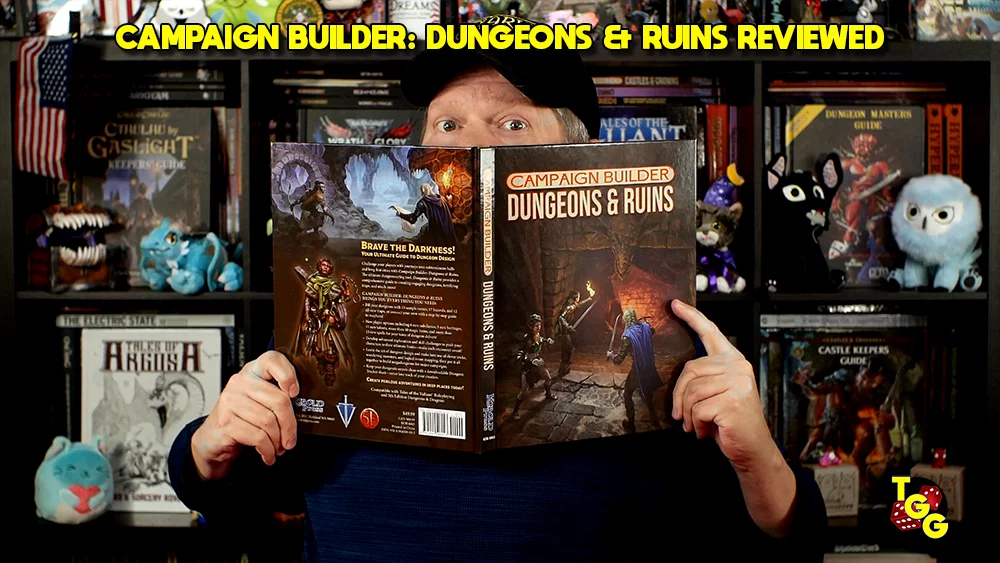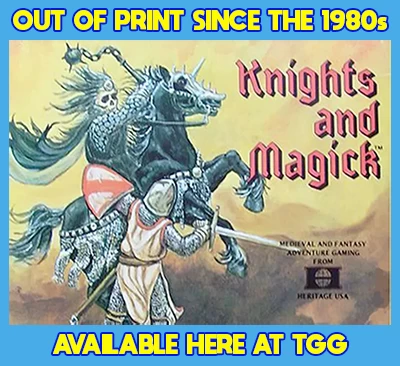
Publisher: Stonemaier Games
Designer: Jamey Stegmaier and Alan Stone
Artist: Jacqui Davis
Year: 2013
Genre: Euro-style worker placement/area control
Players: Two to six players
Ages: 13+
Playing Time: 60 to 90 minutes
MSRP: $70.00
Catch the podcast review right here!
Euphoria is the second title to be released by Stonemaier Games – hot on the heels of Viticulture – and gamers who enjoy a Euro-styled challenge, with a tad more interaction than the norm in that genre, should certainly take notice. The setting is that of an Orwellian future in which the populace is kept under control by a mere handful of the powerful and oppressive elite. Each player is placed at the head of soon to be rival groups in a bid to attain the most power by changing the civilization’s future (possibly for the better or even for the worse) and in doing so placing all ten of the Authority tokens to win the game.
What’s in the Box?
What will strike anyone opening Euphoria’s box is the excellent quality of the components. You’ll find this is a top notch production in all respects, from the artwork and card stock to the Market Tiles and strange looking but interesting “Gear Dice” you’ll be pleased by what you find. Truthfully some gamers feel a bit gipped with some titles when they crack open a box of air, but buyers of Euphoria will surely avoid that pitfall.
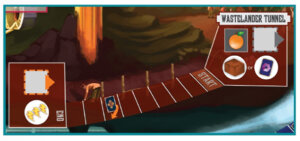
You’ll begin a game of Euphoria by shuffling the Market Tiles and randomly selecting six of these. While areas of the board already contain Markets (the aerial Icarus is a prime example) these tiles allow for additional areas which can be built. The trick here is the drawn tiles are placed face down so no one will know what these Markets may be until someone decides to build one. Any undrawn Market Tiles are removed from play. Progress markers for each player are then placed on the four Allegiance tracks as well as Miner meeples on the three Tunnel tracks. Commodity and Resource tokens are then placed in their respective areas of the board; there are four Commodities (Bliss, Energy, Food, and Water) and three Resources (Clay, Stone, and Gold) used in play.
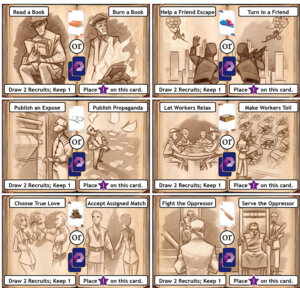
Players also receive Multiplier Markers in which to track their Commodities and Resources. There won’t be enough tokens in the game to display stockpiles so this allows players to keep tabs on the goodies available to spend. Everyone will also place their respective tokens on the Morale and Knowledge tracks accordingly while also marking each of the map’s four Territory Stars with Unavailable Territory tokens so the remaining spaces equal the number of players. Each of the three Tunnels are also marked with unavailable tokens to indicate the Action Space at the end of the Tunnel can’t be used until a Miner reaches it.
Finally, the Artifact deck is shuffled and placed to the side. These Artifacts can be gained throughout the game and act as another form of currency; Artifacts are especially valuable when you have a matching set of two.
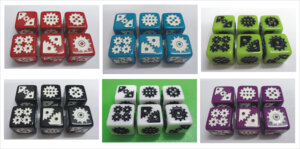
Normally I don’t go into such detail about the setup for most games but the reason I’m doing so here is to drive home the point there will be a lot going on in Euphoria. By a lot I mean there are a multitude of areas for you to place workers and the results of the placement vary wildly. I wouldn’t say Euphoria is overly complex but, at first glance, most people will feel a touch overwhelmed by the game board and all the various icons, tracks, tiles, and so on. When you first sit down to play Euphoria it isn’t overly apparent just what someone should do in order to play or compete for a victory.
Each turn a player can perform one of three actions:
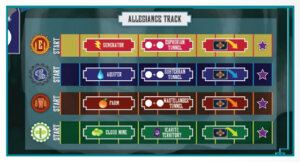
Action Spaces can break down into three types: Temporary Use, One-Time Use, or Multi-Use.
Temporary Use can provide the player with Commodities, Resources, Allegiance points, and more. These spaces can only contain one Worker at a time so if another player later decides to claim that space the original Worker is bumped from the board, rerolled, and then returned to the owning player’s dice pool.
One-Time Use requires a cost to place the Worker but they’ll remain in the space and cannot be bumped.
Multi-Use are open areas which can hold multiple Workers from all the players.
Retrieve any or all Workers – Rather than placing a Worker you can recover as many Workers as you’d like from the board. There’s a cost involved in doing this as indicated on the board. Once you’ve retrieved the Workers you may reroll their dice and place them into your dice pool.
Reveal your Ethical Dilemma – You’ll only do this once during the game but it does count as that turn’s action.
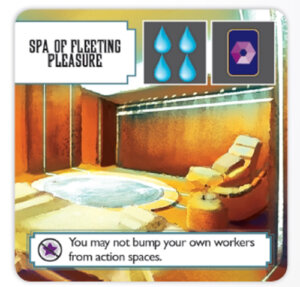
While you would think a game involving a quest to take the reins of power of an Orwellian society would pit player against player, the truth is you’ll actually spend more time doing things which help you (and your opponents around the table) while others’ actions end up helping you as well as opposed to dropping the hammer on fellow players. You’ll also team up with your rivals to build new Markets while those who don’t aid in the construction normally receive a penalty. There are certainly ways to toss a wrench into the plans of others – bumping Workers or blocking other players from aiding in the construction of a Market are prime examples – but I certainly wouldn’t call gameplay cutthroat by any stretch.
Learning and teaching Euphoria will take a bit of time as the title surely isn’t one in which you crack open the box and jump right in. It will take a bit of effort for many players to wrap their heads around all the options available to them with their Worker placement. Euphoria is a game which will take a few playthroughs before all the moving parts fit together and various strategies for a win begin to present themselves.
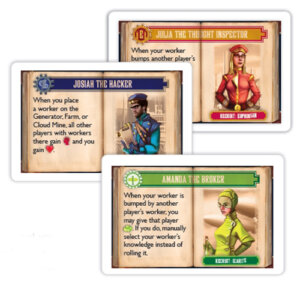
Gamers who aren’t thrilled with luck coming into play might take issue with the dice rolls, cards, and other randomness involved while others may wish for a heavier tie down in the theming. Personally my main criteria when I play a game is how much fun did everyone have around the table. I like the bit of tongue in cheek humor injected into Euphoria (especially the oxymoronically titled Markets) as it isn’t as if we’re looking to game Orwell’s 1984 here folks; sure the classic novel is a must read but it certainly doesn’t leave one feeling warm and fuzzy at its conclusion. Euphoria is meant to be entertaining and, once my gaming gang got a grip on how pieces of the game fit together, we had a damn good time with the proceedings.
Messieurs Stegmaier and Stone have a good handle on game design and with Euphoria as their second extremely solid title, it’s obvious Stonemaier Games is a company to keep an eye on in the future …and I don’t mean in a dystopian future either.
[rwp-review id=”0″]
- The Old Margreve for Tales of the Valiant Reviewed - Apr 27, 2025
- Marvel Comics for April 30th, 2025 - Apr 27, 2025
- DC Comics for April 30th, 2025 - Apr 27, 2025
